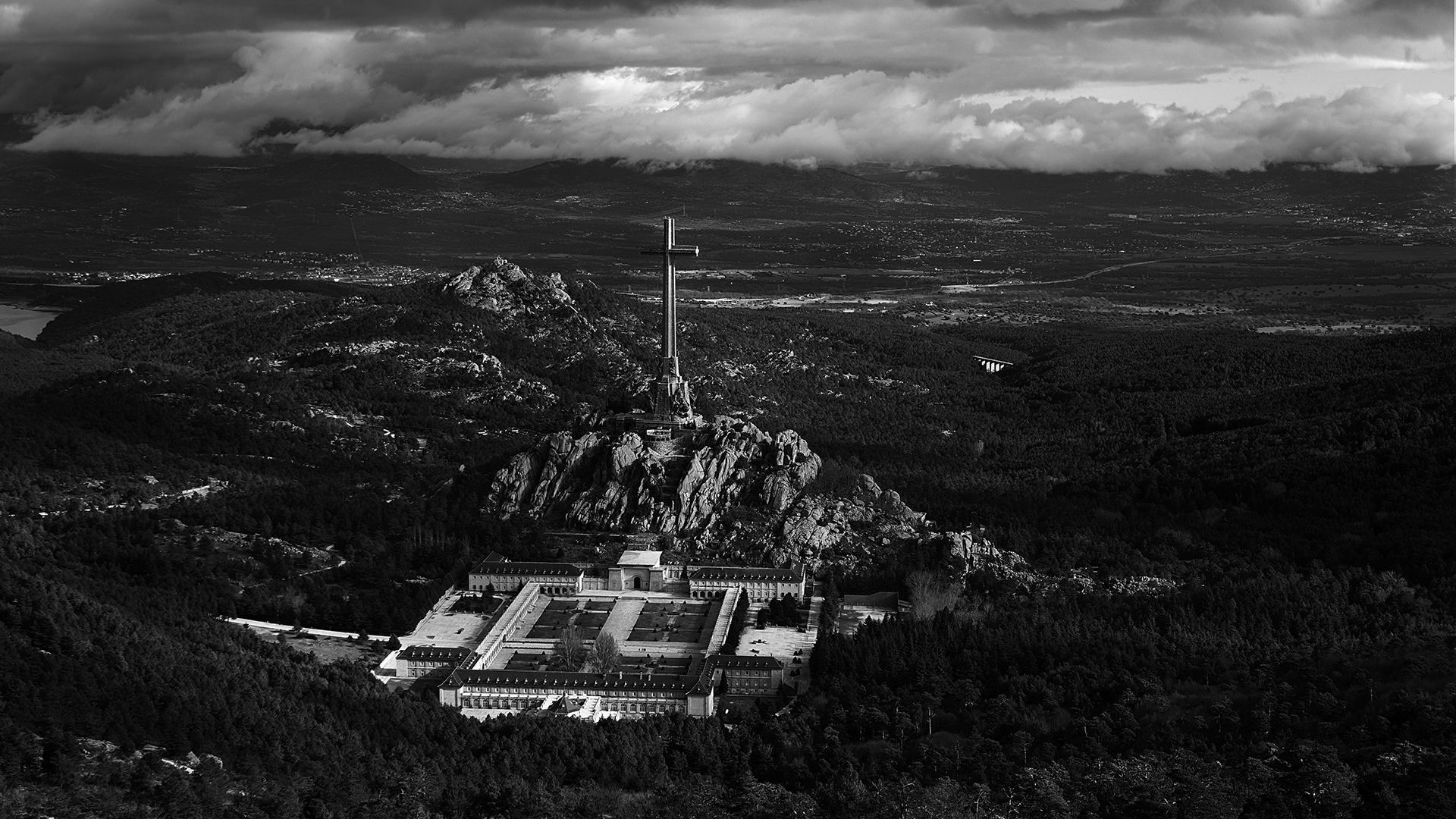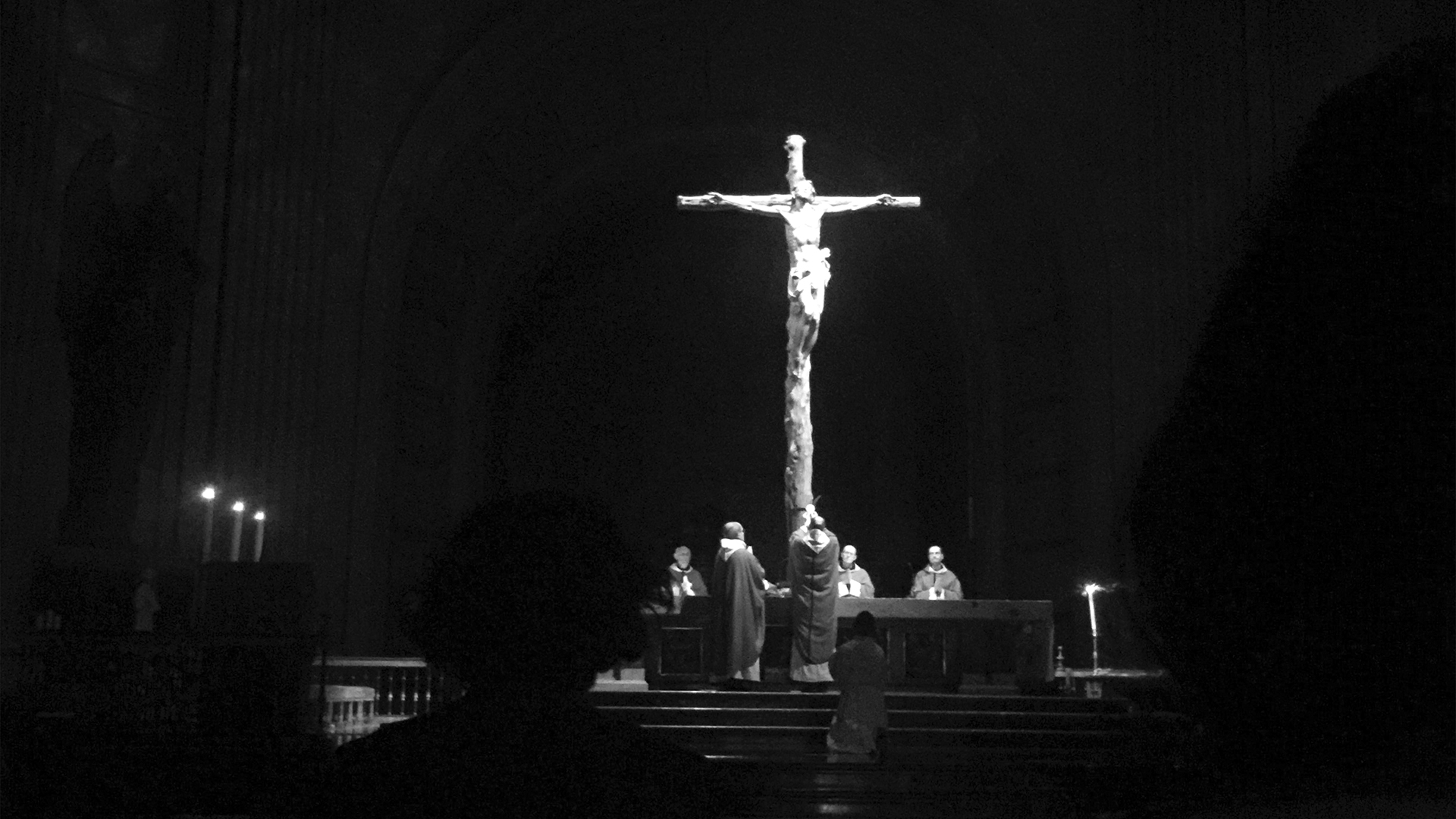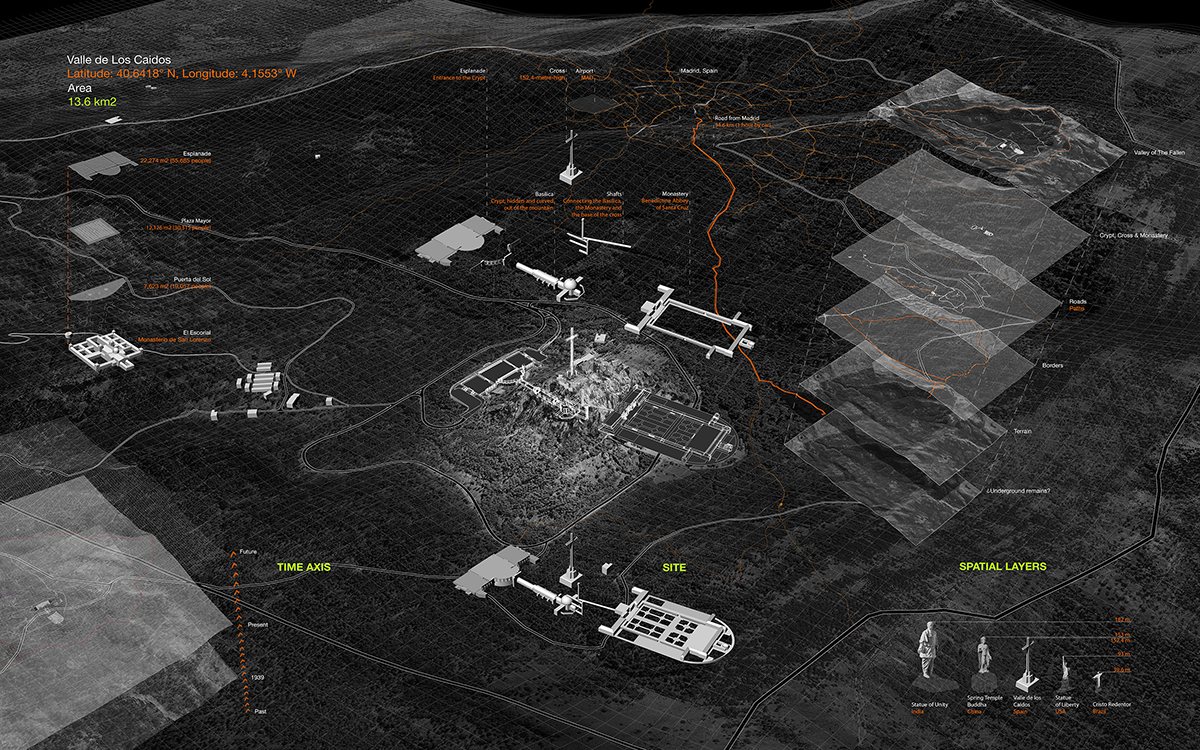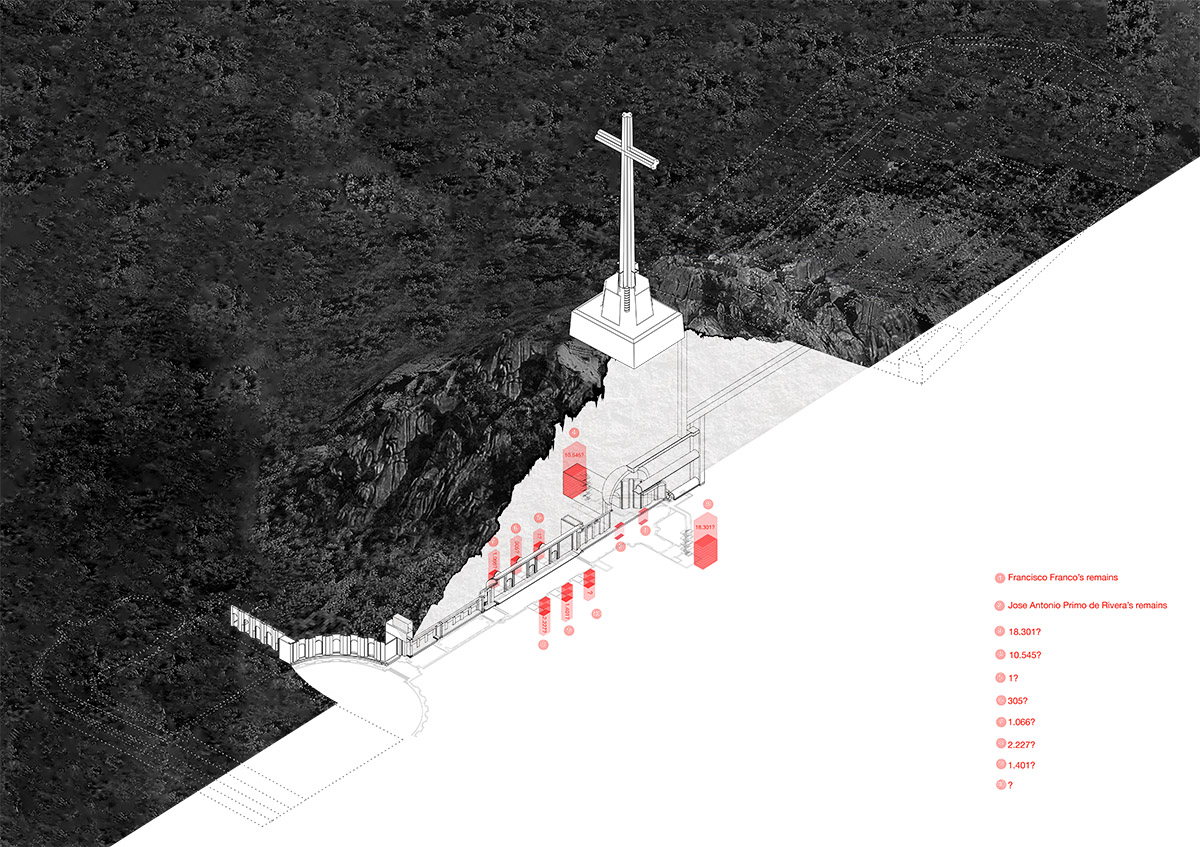Deep Space is a long-term investigative program initiated to deal with politics of memory, controversial space and monuments, digitalization and heritage.
Deep Space: re-signifying Valle de los Caídos aims at developing creative processes, concepts, and ideas that can break through and transform the symbolic power of the place.
Workshop Deep Space: re-signifying Valle de los Caídos @ Medialab Prado & Valle de los Caídos, Madrid, 25-27 October 2018
Opening, Exhibition, Lecture & Discussion Lost Memory – Recovered Memory @ Goethe Institut & Fundación Pablo Iglesias, Madrid, 5 June 2019
Workshop & Lecture @ ISEA 2022 Symposium “Possibilities” Heritage and Futures, Barcelona, 12 & 14 June 2022

How to transform and re-signify Valle de los Caídos (“Valley of the Fallen”), the Francoist monument in the Sierra de Guadarrama close to Madrid?
Valle de los Caídos with its 152-meter-tall cross visible from more than 30 kilometers away and its “basilica”, a 262-meter long crypt with a 42-meter high vault cut out of the granite mountain rock, is one of the world’s most controversial monuments.
The structure was built between 1940 and 1959 partly by the forced labor of Spanish republican political prisoners. Next to the remains of over 33.000 fallen from both sides of the conflict (that were moved there from mass graves spread all over the country), the basilica features Franco’s grave in its most prominent spot – and next to it the grave of the Falangist leader Antonio Primo de Rivera.

On 25th August 2018 the Spanish government approved a decree to exhume Franco’s remains.
On 24th October 2019 Franco’s remains have been exhumed.
What transformations are still needed at Valle de los Caídos so as not to create a cenotaph – an empty burial monument?

The basilica-crypt, piercing the granite mountain, opens to an esplanade with scenic landscape views. Access to the Valle de los Caídos monument is provided by ‘pilgrimage’-style paths and drives, which are embedded within a sophisticated large-scale landscape design in a terrain that still holds remnants of the barracks of the prisoners of war.
Over the past few years, there has been an intensifying discourse and controversial public debate in Spanish society and politics about the transformations needed to be pursued at Valle de los Caídos. Nevertheless there has been no artistic approach to find new possibilities and paths to transform and reinterpret Valle de los Caídos.
“Deep Space: re-signifying Valle de los Caídos” aims at developing creative processes, concepts, and ideas that can break through and transform the symbolic power of the place. The program focuses on artistic/architectural/landscape/media proposals and creative processes that develop future visions, breaking through the biased discussion.
“Deep Space: re-signifying Valle de los Caídos” derives its strength from the potential of an “outsider” approach that can bring a new perspective to a contentious and intractable situation. The workshop includes creative sessions and discussions bringing together Spanish and international creative professionals (such as architects, designers, artists, sound artists, performers, theatre-makers), theoreticians, historians, ethnologists, forensic archeologists, heritage and cultural studies experts, juridical experts, psychologists and psychoanalysts.
Complementary to the general public discussion circling mainly around the correct location for the remains of Francisco Franco and Antonio Primo de Rivera, the “Deep Space: Re-signifying Valle de los Caídos” workshop focuses on (the mostly anonymous) ‘fallen’ and on the convicted that hauled up the lumps of rock.
Who built Thebes of the seven gates?
In the books you will read the names of kings.
Did the kings haul up the lumps of rock? …
From “Fragen eines lesenden Arbeiters” (“Questions from a Worker Who Reads”) by Bertolt Brecht, 1935; translation by Michael Hamburger: Brecht, Bertolt, Poems 1913-1956, Methuen, New York/London 1976.
“Deep Space: re-signifying Valle de los Caídos” aims to develop creative tools for dealing with such a controversial monument. These tools can be of very different character and be spatial – physical, digital or hybrid (combined physical and digital). As instruments, these tools also have a strong process-related dimension.
Hybrid (combined physical and digital) technology tools offer the possibility to process the transformation of a monument without physical interference. Such tools include Augmented Reality (AR), Virtual Reality (VR), Mixed Reality (XR), and Augmented Virtuality (AV).
The workshop creates a framework where international experiences with such instruments can inform the Valle de los Caídos transformation process. At the same time, the focus on such a concrete and very actual case study as Valle de los Caídos provides the opportunity to develop insights that are of a more general relevance for dealing with monuments and heritage.
“Deep Space: re-signifying Valle de los Caídos” develops an inspirational atmosphere where creative professionals and experts reflect on a typology of creative/artistic proposals. A typology of proposed tools functions as a test environment for opening up perspectives related to the Valle de los Caídos transformation, while simultaneously helping to inform the possible direction and process for the further development of the “Deep Space” project.

Thursday 25.10.18: Visit to Valle de los Caídos.
Leaving from Madrid at 9.00 and arriving at 10.15 at Valle de los Caídos for the 11:00 mass followed by an extensive guided tour of Valle de los Caídos.
Friday 26.10.18: all day workshop from 10.00 to 14.00 and from 15.00 to 19.00 at Medialab Prado, Madrid.
Saturday 27.10.18: morning workshop from 10.00 to 13.30 at Medialab Prado, Madrid.
The workshop “Deep Space: re-signifying Valle de los Caídos” was initiated and conceptualized in February 2018 by Hybrid Space Lab as an element of the long-term “Deep Space” exploration and intervention program.
“Deep Space: re-signifying Valle de los Caídos” is initiated, organized, and curated by
Prof. Elizabeth Sikiaridi and Prof. Frans Vogelaar of Hybrid Space Lab.
Joris van Ballegooijen, Coordinator Digital Culture and Transmedia, Creative Industries Fund NL, interested in the design and the digital/transmedia storytelling perspective on controversial cultural heritage
Dr. Isabel Cadenas Cañón, Writer, Audio Producer and Scholar, Professor of Cultural History and Memory at New York University-Madrid, and Tufts-Skidmore Spain; both her research and her art focus on how to forge subversive ways of memory, always from a feminist-materialist approach
Dr. Alberto Corsín Jiménez, Associate Professor in the Department of Anthropology at the Spanish National Research Council (CSIC), interested in the archival and technical cultures of urban social movements
Silvia Fernández, Regional Program Manager – Europe and Asia, International Coalition of Sites of Conscience, interested in multidisciplinary approaches to dealing with the past
Dr. Francisco Ferrándiz, Anthropologist, Spanish National Research Council (CSIC), former Member of the official governmental Commission of Experts on the Future of the Fallen in 2011
Marcos García Cristobal, Artistic Director Medialab Prado
Dr. Alfredo González-Ruibal, Archeologist, Spanish National Research Council (CSIC), working on the archaeology of the contemporary past and conducting archaeological work on the Spanish Civil War and the Franco dictatorship
Dr. Marije Hristova, Postdoctoral Researcher at the Spanish National Research Council (CSIC), and Founding Member of the association Memoria en Red which organizes debates, exhibitions and events related to the topic of remembrance
Prof. Dr. María Dolores Jiménez-Blanco, Director of the Art History Department, Universidad Complutense, Madrid, and Curator of the exhibition Campo Cerrado (Museo Reina Sofía, Madrid, 2016), a review of Spanish art and culture in the first years of Franco’s dictatorship
Dr. Lidia Mateo Leivas, Coordinator of “IMPRESSIONS. A memory process workshop”, Art Historian, Cultural Critic and Researcher, Founding Member of Memorias en Red, interested in memory, radical imagination, visuality, and the transmission of knowledge
Dr. Francisco Orengo, M.D, Psychiatrist, Psychotherapist and Psychotraumatologist, Specialist in Forensic Psychiatry, Author of articles on the so-called “Historic memory Law” as well as processes of grief in traumatized societies through war and catastrophes, former Board Member of the European Society for Traumatic Stress Studies (ESTSS) and Leader of the Human Rights task force
Dr. Marina Otero Verzier, Architect and Researcher, Director of Research at Het Nieuwe Instituut in Rotterdam and Curator of the Dutch Pavilion at the Venice Architecture Biennale 2018
Prof. Dr. Matthias Rauterberg, Chair “Designing Interactive Systems”, Co-founder of the Industrial Design Department and Data Science Center at Eindhoven University of Technology (TU/e) and of the Technical Committee of Entertainment Computing of the International Federation for Information Processing (IFIP)
Miguel Rodríguez Cruz, Member of Basurama, a creative studio devoted to bring circular economy solutions in architecture, art, and design for the abundance of waste, dysfunctional urban spaces, abandoned infrastructures, decadent monuments, and other by-products of mass consumption society
Marie-Louise Ryback-Jansen, Head of the “Contested Histories in Public Spaces Project” of the Institute for Historical Justice and Reconciliation, The Hague, and former Director of the “Holocaust Education and Genocide Prevention Program” at the Salzburg Global Seminar in Austria
Dr. Timothy W. Ryback, Director of the Institute for Historical Justice and Reconciliation, The Hague, former Deputy Secretary General of the Académie Diplomatique, Paris, has written extensively on the intersection between culture and politics
Fernando Sanchez Castillo, artist
Prof. Dr. Margriet Schavemaker, Manager Education, Interpretation and Publications at the Stedelijk Museum Amsterdam, Professor of Media and Art in Museum Practice at the University of Amsterdam
Prof. Dr. William (Bill) Swartout, Chief Technology Officer, USC Institute for Creative Technologies, University of Southern California, Research Professor, Computer Science
Prof. Susana Velasco, Architect, Professor in Graphic Ideation at the School of Architecture of the Polytechnic University of Madrid; she researches architecture as a place of mediation between two scales: that of the body and that of the territory; her work seeks to give a materiality to the links between the communities and the landscape they inhabit
Prof. Dr. Frank van Vree, Director of NIOD Institute for War, Holocaust and Genocide Studies, Professor of History of War, Conflict and Memory, University of Amsterdam
Prof. Dr. Kyung Jin Zoh, Director of the Environmental Planning Institute, Department of Landscape Architecture, Graduate School of Environmental Studies, Seoul National University, Head of “Facing North Korea, The Observatory Project” on the Korean Demilitarized Zone
With a lot of thanks for their advise to the curators Ferran Barenblit, Chris Dercon, and Hendrik Folkerts.
Prof. Elizabeth Sikiaridi and Prof. Frans Vogelaar are presenting the project “Deep Space: Re-signifying Valle de los Caídos” and contributing to the panel “Lost Memory – Recovered Memory” („Memoria perdida – memoria recuperada“), discussing together with the photographer Miquel Gonzalez, the journalist Emilio Silva and the historian Prof. Gutmaro Gomez Bravo (Contemporary History, Universidad Complutense de Madrid).
The panel discussion is followed by the opening of the photo exhibition „Memoria perdida” of Miquel Gonzalez and of the public space installation “Deep Space: Re-signifying Valle de los Caídos” by Hybrid Space Lab.
At the Goethe-Institut Madrid, the elaborated workshop graphics of the Valley of the Fallen will be presented on the outside facade of the building. There is an accompanying free brochure in German and Spanish with detailed information.
The Pablo Iglesias Foundation, in collaboration with the Goethe-Institut of Madrid, organizes a round table entitled Memory Wounded Memory Recovered. Miquel González, photographer, Elizabeth Sikiaridi and Frans Vogelaar, founders of Hybrid Space Lab, Gutmaro Gómez Bravo, Professor of Contemporary History at the Complutense University of Madrid and Emilio Silva, Sociologist, political scientist and president of the Association for the Recovery of Historical Memory.
The Table will address the culture of memory and the debates that surround it, coinciding with the inauguration of the exhibition of the same name, framed in PhotoEspaña 2019.
The workshop Conflict Space, which deals with the re-signification of a very contentious Franco monument, is part of the Deep Space research on the politics of memory and heritage in the digital age.
Revealing the potential hidden in the intersection of art, technology and memory studies, the project lifts the veil on the poignant historical meanings of the monument and examines its possible future.
The workshop addresses the interconnected dimensions of hybrid heritage and of inclusive memory-making as well as dealing with controversial monuments in the Digital Age.
related PROJECTS
related PRESS
related NEWS